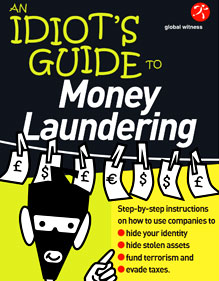
Transparency International’s campaign has already made an impact at the recent G20 summit in Brisbane, Australia, where participating leaders agreed, among others, to endorse an anti-corruption action plan for 2015-2016. This will include measures to make international tax rules more transparent, and to remove the opacity around the beneficial ownership of companies. Both of these factors allow corrupt individuals to channel their dirty money into foreign countries where they can spend it with impunity.
Now, a report just released by international monitoring organisation Global Finance Integrity (GFI) and titled Illicit Financial Flows from Developing Countries: 2003-2012, sheds more light on why this is such a serious problem. Using the World Bank Residual Method and International Monetary Fund Direction of Trade Statistics, the study applied these existing methodologies to data drawn entirely from International Monetary Fund balance of payments and international trade statistics.
The GFI report – the sixth edition – tracks the outbound flow of money from 2003 to 2012, and covers over 140 developing countries in sub-Saharan Africa, the Middle East and North Africa (Mena), Asia, Europe and the western hemisphere, which includes South and Central America and the Caribbean region.
“It reaffirms the US$1-trillion estimate of unrecorded money shifting yearly out of emerging market and developing countries,” notes the report’s executive summary.
While the study shows that Asia suffers the greatest volume of illicit financial flows, comprising 40.3% of the global total over the 10 years, and the greatest increase in such flows occurred in the Mena region, sub-Saharan Africa is not exempt – although the region’s $528.9-billion is the smallest portion (8%) of the total mind-boggling sum of $6.587-trillion. However, sub-Saharan Africa recorded the second highest increase in illicit flows – 13.2% per year, compared to 24.2% in the Mena.
To put it in perspective, the $6.6-trillion taken illegally out of the countries under scrutiny is slightly more than the combined sum of $6.5-trillion which came in as foreign direct investment and official developmental assistance to those countries over the same 10-year period.
“Save for a brief slowdown during the financial crisis, illicit financial flows have been allowed to grow unchecked over the past decade,” the GFI report says. “In 2012, illicit outflows reached a staggering new peak of $991-billion.”
On average, says the study, the “top five exporters of illicit capital over the past ten years on average are China, Russia, Mexico, India, and Malaysia”. Three of these countries are partners with South Africa in the Brics economic bloc of developing countries.
South Africa now a top 10 country for illicit outflows
The GFI report ranks the countries with the top average illicit financial outflows during the 10-year period of the study – and South Africa has moved into the last spot in the top 10, overtaking Iraq, which dropped to 11. In the 2013 GFI report, South Africa stood at 13.
Only one other African country, Nigeria, is in the top 10, ranked ninth.
The top 10 list does exclude Saudi Arabia and the Emirates, GFI states, because of an “unusually high” percentage of errors and omissions in their financial records.
If Saudi Arabia and the Emirates are included, South Africa drops to 12 – still not an achievement to be proud of.
Every year, millions of rands are moved illegally out of the country. South Africa loses an average of $12.2-million a year, or about R142-million at today’s exchange rate, to the illegal movement of money over its borders.
A report in the Mail & Guardian cites the Thabo Mbeki Foundation as explaining the origin of this practice in Africa. It dates back to the 1960s, when “many multinational corporations, insecure about the political future of their host countries after decolonisation, sought mechanisms to move their profits offshore”.
Such money is viewed as a lost economic or developmental opportunity. “Illicit financial flows have major consequences for developing economies,” explains report co-author Joseph Spanjers. “This is a trillion dollars that could have contributed to inclusive economic growth, legitimate private-sector job creation, and sound public budgets.”
The GFI hastens to add that these figures are conservative, and do not include “cash movements primarily from criminal activities, such as drug trading, human trafficking, much of counterfeiting, etc.” So the actual amount of lost capital is likely to be higher.
What can be done?
The GFI makes a number of recommendations which will help to alleviate current levels of opacity in the global financial system and crack down on the money outflow. The most significant ones are that:
- governments should establish public, regularly updated registries of meaningful beneficial ownership information, which will reveal the “true, human owner of all corporations and other legal entities”;
- financial regulators should require that all banks in their country know the true beneficial owner(s) of any account opened in their financial institution;
- government authorities should adopt and fully implement all of the Financial Action Task Force’s recommendations to combat money laundering and associated terrorist financing;
- regulators and law enforcement authorities should ensure that all of the anti-money laundering regulations, which are already on the books, are strongly enforced;
- policymakers should require multinational companies to publicly disclose their revenues, profits, losses, sales, taxes paid, subsidiaries, and staff levels on a country-by-country basis;
- all countries should actively participate in the worldwide movement towards the automatic exchange of tax information as endorsed by the OECD and the G20;
- trade transactions involving tax haven jurisdictions should be treated with the highest level of scrutiny by customs, tax, and law enforcement officials;
- governments should significantly boost their customs enforcement by equipping and training officers to better detect intentional misinvoicing of trade transactions; and
- the UN should adopt a clear and concise sustainable development goal to halve trade-related illicit financial flows by 2030 and similar language should be included in the outcome document of the Financing for Development Conference in July 2015.

